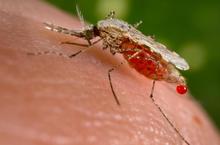New research reported in Biotech Daily Weekly News Round-Up shows that the cytokine known as interferon-lambda prevents West Nile virus from infecting brain cells by reducing transport of large molecules across the blood-brain barrier.

Mosquito - Carrier of West Nile virus
Studying West Nile virus infection in mice, researchers have shown that the antiviral compound interferon-lambda tightens the blood-brain barrier, making it harder for the virus to invade the brain.
Mosquitoes are known to infect people and animals with West Nile virus. Studying West Nile virus infection in mice, researchers have shown that the antiviral compound interferon-lambda tightens the blood-brain barrier, making it harder for the virus to invade the brain.
To explain the protective effect of interferon-lambda, investigators at the Washington University School of Medicine (St. Louis, USA) worked with cultures of mouse keratinocytes and dendritic cells and with a line of mice that had been genetically engineered to lack the gene for the interferon-lambda receptor.
Experiments with cell cultures failed to show a direct antiviral effect of added interferon-lambda, even though expression of interferon-stimulated genes was induced.
In animal studies, normal mice and mice lacking the IFNLR1 gene were treated with interferon-lambda at the same time they were infected with the West Nile virus. The mice received additional interferon-lambda treatments two and four days following infection.
Results published in the April 22, 2015, online edition of the journal Science Translational Medicine revealed that there were no differences in West Nile virus burden between normal and mutant mice in the draining lymph nodes, spleen, or blood.
On the other hand, there was increased West Nile virus infection in the brain and spinal cord of the mutant mice, but this was not associated with a direct antiviral effect in mouse neurons. Ultimately it was seen that while typically less than 20% of normal, untreated mice survived such a high dose of the virus, survival rates rose to more than 40% of the mice treated with interferon-lambda.
Additional experiments revealed that treatment of mice with pegylated interferon-lambda resulted in decreased blood-brain barrier permeability, reduced West Nile virus infection in the brain without affecting the number of virus particles in the blood, and improved survival against lethal virus challenge.
An in vitro model of the blood-brain barrier showed that interferon-lambda signaling in mouse brain microvascular endothelial cells increased electrical resistance, decreased virus movement across the barrier, and modulated tight junction protein localization in protein synthesis.
"Viruses are most dangerous when they enter the brain," said senior author Dr. Michael Diamond, professor of medicine at the Washington University School of Medicine.
"Compared with untreated mice, we found significantly lower concentrations of the virus in the brain among mice treated with interferon-lambda. Interferon-lambda has significantly fewer receptors in the body, which may mean using it as a treatment is likely to have fewer side effects."
"It is also possible that interferon-lambda may influence other protective barriers in the body, such as those in the skin and the gut, an area of research my laboratory is investigating."
This research is good news for horse owners as well as people that might be exposed to West Nile virus. In horses and humans that become clinically ill, the West Nile virus invades the brain, infecting the central nervous system and causing symptoms of encephalitis.
